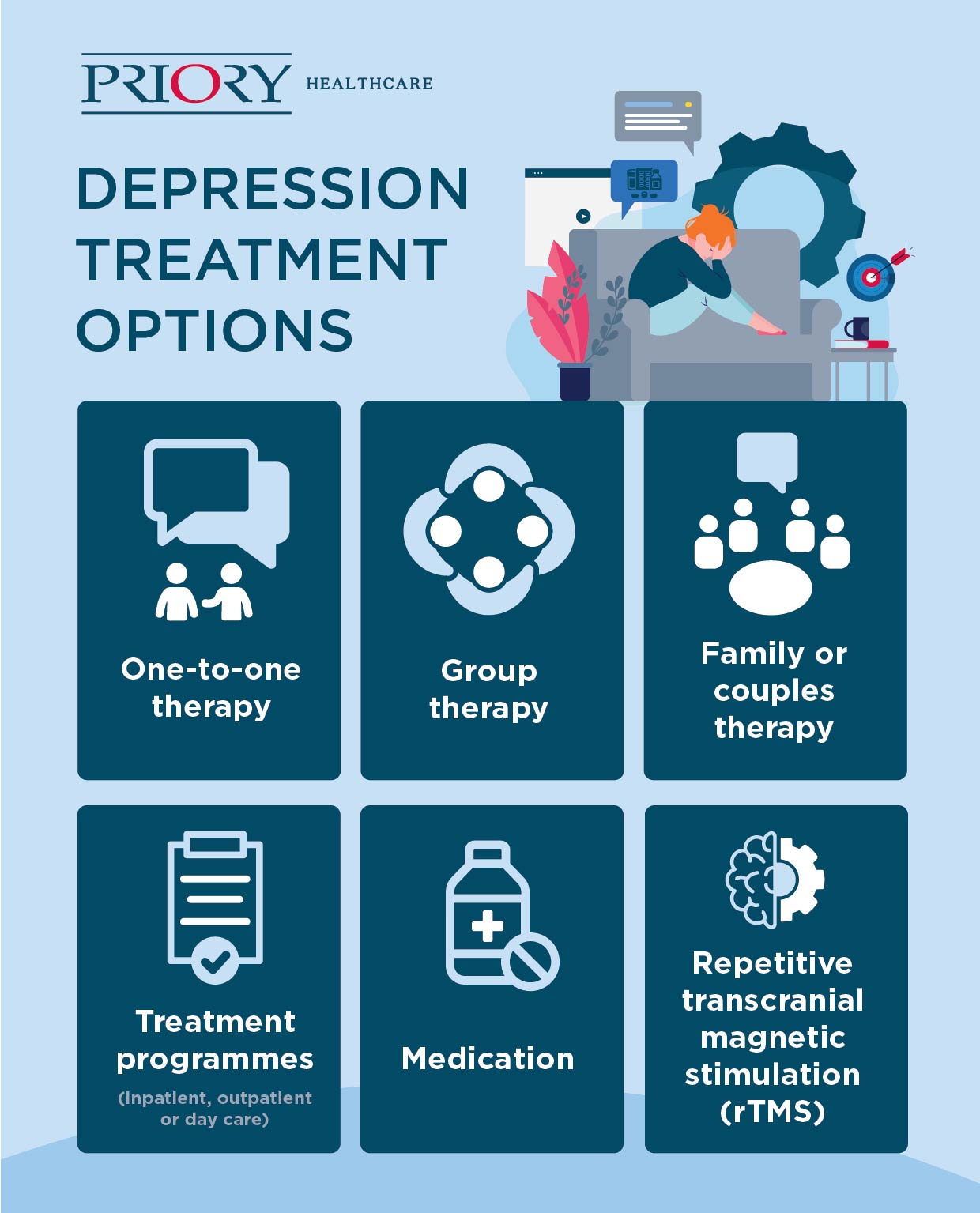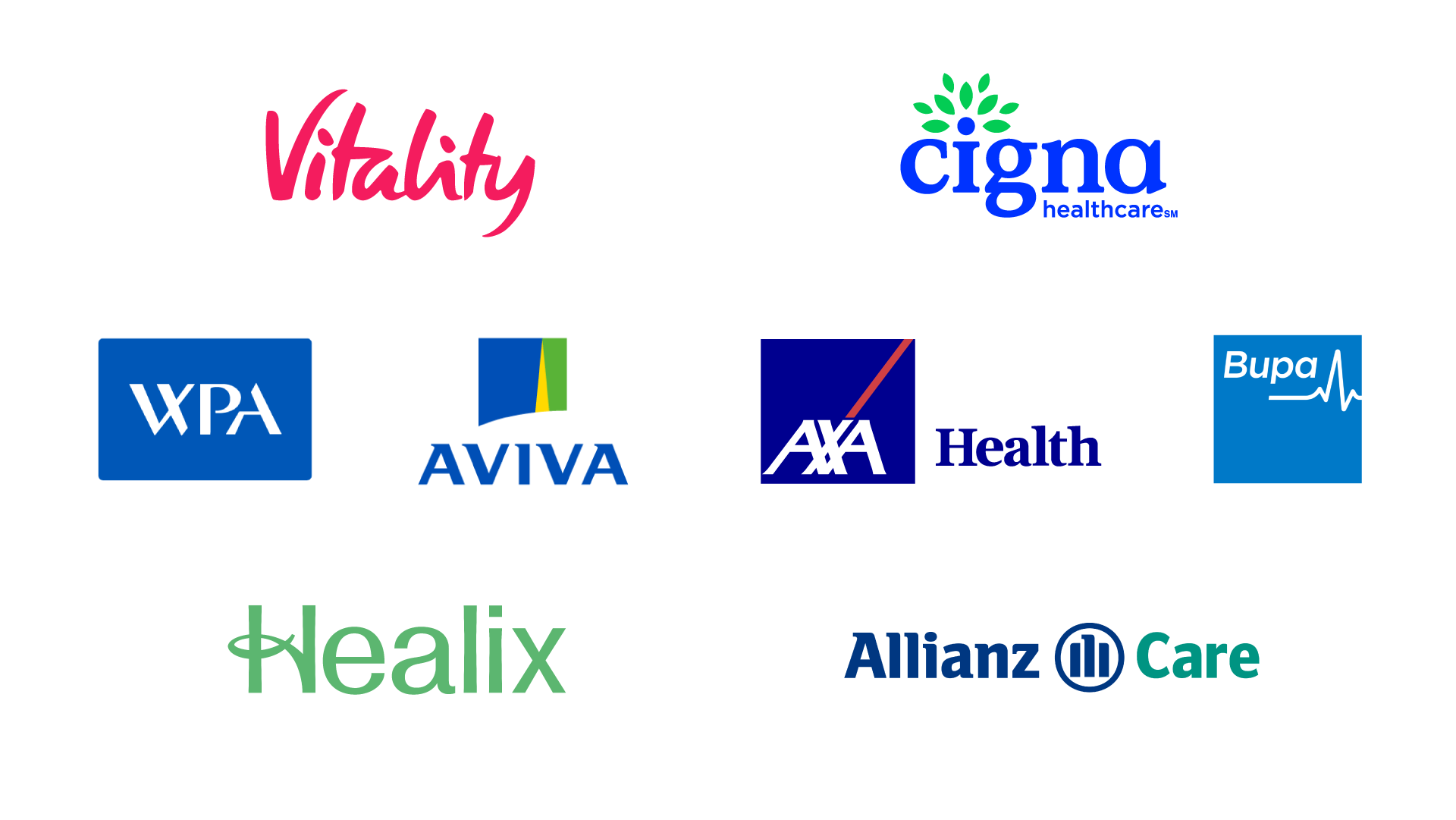Understanding and treating depression
Get help for depression from the very best mental health experts at Priory.
Depression is a complex mental health condition that affects millions of people worldwide. The impact of depression reaches far beyond the individual; it can have an impact on your relationships, work productivity and overall quality of life. It’s crucial to understand that depression isn’t a sign of weakness or a personal flaw - it’s a legitimate medical condition that needs attention and treatment.
In this guide, we’ll aim to provide you with valuable insights, evidence-based strategies, and a supportive approach to navigating depression treatment. Remember, depression is entirely treatable, even in the most severe of cases.
To effectively navigate depression treatment, it’s important that you have some understanding of this mental health condition. Depression typically causes you to experience persistent low moods. Sometimes, these can be so bad that you find that you can’t function effectively in your daily life. Other symptoms of depression include things like:
The causes of depression are complex and are believed to involve a combination of genetic, biological, environmental and psychological factors. While anyone can develop depression, certain risk factors may increase your susceptibility to this condition.
There are also lots of different types of depression. Each type has distinct characteristics and triggers, and need tailored treatment approaches. These include:
Diagnosing depression involves a thorough evaluation by a healthcare professional, usually a psychiatrist or a mental health specialist. The diagnostic process includes a comprehensive assessment of symptoms, medical history, and potential causes and risk factors.
Healthcare professionals may use standardised criteria, such as the DSM-5, to help them to diagnose you with depression. They may also aim to rule out other medical conditions that can mimic depression symptoms. Getting a diagnosis for your depression is really important because it lays the foundation for developing an appropriate treatment plan, helping you to take steps towards a positive future.
Depression is a pervasive mental health disorder that affects people from all walks of life. Statistics collected on depression from the National Institute for Health and Care Excellence (NICE) and the Office for National Statistics (ONS), estimate that around one in six people in the UK will experience depression at some point in their lives.
These numbers highlight the significance of this condition and emphasise the importance of raising awareness and understanding. Depression doesn’t discriminate based on age, gender or socioeconomic status; it can affect people from all backgrounds.
When it comes to depression, there are a variety of treatment options available. These have been designed to address the complexities of this condition, and support people to get back on track. Treatment plans should be tailored to each person's specific needs, and a combination of approaches is likely to be the most effective.

Talking therapies play a vital role in depression treatment. One of the most common types of depression therapy is a technique known as cognitive behavioural therapy (CBT). CBT is used all over the world to treat lots of mental health conditions, including depression. It’s based on the principle that unhelpful, deep rooted thought patterns.
CBT works by identifying and changing your unhealthy thought patterns and any negative behaviours. This helps you to think in a more balanced way and challenge any negative assumptions you have.
It also helps you to learn coping mechanisms that you can use for the rest of your life. These allow you to recognise when you’re experiencing negative thoughts and respond to them in a healthy way. This reduces the likelihood of you becoming depressed again in the future. Find out more about CBT for depression.
Other therapies may also be beneficial in depression treatment, depending on your individual needs and preferences. These include:
Alongside CBT and other forms of therapy, medication can also be useful in treating depression. This can help to complement talking therapy and also acts as a further barrier against your depression.
However, for some people, antidepressants will be the first line of treatment for depression, especially when:
Antidepressant medications, such as selective serotonin reuptake inhibitors (SSRIs), serotonin-norepinephrine reuptake inhibitors (SNRIs) and tricyclic antidepressants (TCAs), can help regulate brain chemicals and alleviate symptoms.
It’s crucial to work closely with a healthcare professional to find the most suitable medication for you, understand its potential side effects and make sure you’re taking this as prescribed.
Alternative treatments for depression are also worth considering. Supplements such as omega-3 fatty acids, vitamin D, and herbal remedies like St John's Wort have shown some benefits when it comes to tackling mild to moderate depression.
Also, mind-body techniques such as yoga, meditation, and acupuncture can promote relaxation and emotional wellbeing, helping to reduce depression symptoms. Lastly, light therapy, specifically used for SAD, involves exposure to bright light to regulate your circadian rhythm and improve mood.
In some cases, you might need residential depression treatment within a hospital. This is especially the case if your depression is severe, or accompanied by significant risk factors.
Residential mental health hospitals can provide specialist inpatient treatment for depression, offering intensive therapy, medication management, structured routines and a supportive environment. It also gives you the chance to spend some time away from any outside influences that might be making your depression worse.
Residential depression treatment is likely to be the best option for people who need a higher level of support to stabilise their condition.
In addition to professional interventions, lifestyle changes can play a crucial role in coping with depression symptoms. A balanced diet, regular exercise, sufficient sleep, relaxation techniques, and doing things you enjoy, can significantly improve your wellbeing. These lifestyle adjustments can complement other treatment approaches and enhance the effectiveness of depression management strategies.
Remember, each person's experience with depression is unique, and treating it takes patience and collaboration. However, with the right support, it’s entirely possible for you to make a full recovery.
Alongside clinical treatment, there are a range of coping strategies for depression, and other sources of support that you can draw upon to help with your condition.
Here are some tips to help you cope and find the support you need:
Remember, coping with depression is a personal journey, and what works for one person may not work for another. Be patient with yourself and look for support that meets your needs. By building a network of support and implementing healthy coping mechanisms, you’ll be able to start getting back on track.
Every year at Priory, we care for thousands of people who have chosen to take the first steps to recovery. You can read their stories here.
These are inspiring accounts of people who have received depression and mental health treatment with us, showing what can be achieved through specialist care and support. Each story is a testament to the dedication and expertise of our Priory team, and the life-changing impact that comprehensive mental health support can have.
At Priory, we’re renowned for our comprehensive and specialised depression treatment options, providing people with a range of choices to suit their needs. Whether you need intensive care or are looking for more flexible treatment options, we can offer a variety of programmes to support you.
We will always learn about your unique circumstances before setting out any treatment options, so that we’re able to give you the support that works for you. Depending on the severity of your depression, we have a number of different treatment programmes that we can offer to you.
If you find that feelings of sadness and hopelessness are overwhelming and are hindering your ability to go about your daily life, this is a sign that you need to seek professional support.
You don't have to face this alone; depression is treatable and you can fully recover. Priory successfully assists thousands of people every year in addressing their depression and regaining the enriching lives they deserve.
If you think you’re struggling with depression or have noticed that you’re showing some of the symptoms of depression, it’s really important that you speak to a professional. Without effective treatment, depression can get worse and can have a negative impact on all areas of your life. Getting help early is key.
You can speak to your GP, who can offer an initial assessment and advice, or you can get fast access to private depression treatment with Priory.
Whichever avenue you take, there are a number of things you can do to prepare for your first contact with a mental health professional.
Gather relevant information: before the appointment, it’s a good idea to make a list of your symptoms, including how long they’ve been going on for and how severe they are. It can also be useful to make a list of any medications that you’re currently taking. Be prepared to talk about any significant life events, stressors or changes that may have contributed to the way you’re feeling.
Bring necessary documents: take any relevant documents with you to the appointment, such as medical records, previous test results or notes from other professionals you may have seen about your mental health.
Prepare questions: write down any questions you have about depression and treatment options, as well as any concerns you have. This will help to ensure that you cover all your queries during the appointment.
Be open and honest: during the appointment, it’s really important that you’re open and honest about your symptoms, thoughts and feelings. The more transparent you are, the better the professional will be able to understand your situation and recommend the best treatment for you. There’s no need to feel embarrassed or ashamed about anything you want to say. GPs and other experienced medical professionals are compassionate and understanding, plus everything you say will be confidential.
Take notes: it might be a good idea for you to take a notebook to your appointment so you can jot down important information. This will help you to remember key points and any treatment recommendations.
Discuss referral to a mental health specialist: if you are speaking to your GP and feel that you need support from a mental health specialist for your depression, you can ask whether they would be able to refer you to a mental health treatment provider, such as Priory. They’ll be able to give you more information on the referral process, next steps, and potential funding options.
What sets Priory apart is our team of highly skilled professionals, who have extensive experience in treating depression. Our Priory team consists of psychiatrists, psychologists, therapists, nurses and support staff, all of whom are dedicated to providing personalised support to everyone we care for. We have extensive expertise in understanding the complexities of depression and tailoring treatment plans to address your unique needs. By taking a holistic and multidisciplinary approach, we ensure that you receive comprehensive support for your mental, emotional and physical wellbeing.
We also focus on empowering you to take an active role in your recovery. Through collaborative treatment planning and a person-centred approach, we will help you to develop strategies for managing your depression symptoms. This enables you to achieve long-term wellbeing, giving you the tools you need to maintain your progress when your initial treatment with Priory is over.

We are a registered and approved provider for all of the UK's leading private medical insurers. All of the services we offer at Priory can be funded through private medical insurance. This includes:
All clients will have access to our highly skilled and accredited clinicians, many of whom are published experts in their fields of treatment. Whatever your requirements, we're committed to working with you to get your life back on track.
We have depression treatment centres located throughout the country, ensuring that you can access the support you need in a location that's convenient for you. To find your nearest depression treatment centre, please use the search form below.